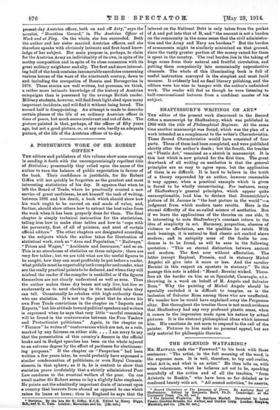A POSTHUMOUS WORK OF SIR ROBERT GIFFEN.*
THE editors and publishers of this volume show some courage in sending it forth with the uncompromisingly repellent title of Statistics ; presumably they relied upon the name of the author to turn the balance of public expectation in favour of the book. Their confidence is justifiable, for Sir Robert Giffen will not quickly be forgotten as the greatest and most interesting statistician of his day. It appears that when he left the Board of Trade, where he practically created a new service of great usefulness, he Bet himself the task of writing, between 1898 and his death, a book which should show how his work ought to be carried on and made of value, and, further, should show others how to extract the best value from the work when it has been properly done for them. The final chapter is simply technical instruction for the statistician, telling him how to make clear tables and how to "cope with the perversity, first of all of printers, and next of certain official editors." The other chapters are designated according to the subjects which the author takes for illustration of statistical work, such as "Area and Population," " Railways," "Prices and Wages," "Accidents and Insurance," and so on. This is no storehouse of statistics on these subjects ; there are very few tables ; but we are told what are the useful figures to be sought, how they can mostprofitably be put before a reader, what pitfalls must be expected by both compiler and reader, what are the really practical points to be deduced, and where they will mislead the reader if the compiler is unskilful or if the figures themselves are not clearly understood as well as seen. Thus the author makes these dry bones not only live, but live so exuberantly as to need checking in the manifold tales they can tell. Occasionally be rebukes with high authority those who use statistics. It is not to the point that he shows his own Free Trade convictions in the chapter on "Imports and Exports," but his attitude toward political speakers and writers is expressed when he says that very little "careful reasoning will be found in the controversies between the Free Tuaders and Protectionist politicians." Again, in the chapter on " Finance" he writes of " controversies which are not, as a rule, marked by any fairness on either side. ... I am sorry to say that the, presentation of this country's finance in the official books and in Budget speeches has been on the whole injured to an extreme degree by the effort of partisans for electioneer- ing purposes." If the chapter on "Pauperism" had been written a few years later, he would probably have expressed a similar condemnation of politicians, or even Royal Commis- 'loners, in that sphere; as it is, he is content to show that statistics prove irrefutably that a strictly administered Poor Law conduces to the eventual welfare of the poor. On one small matter Sir Robert seems to lay a slightly false emphasis. He points out the admittedly important drain of interest upon a country that borrows from abroad as opposed to one which raises its loans at borne: thus in England he says that the
• titattalos. By the late she Onion, IC.C.B.. Edited by Henry Hine, 9410f4 9. U, Yale. London; Macmillan and Co, Lisa astd interest on the National Debt is only taken from the pocket of A and put into that of B, and "the amount is not a burden on the community in the same sense that the civil administra- tion and the Army and Navy are burdens." But the burden of armaments might be similarly minimized on that ground, since the vastly greater portion of the money raised for them is spent in the country. The real burden lies in the taking of huge sums from their natural and fruitful circulation, and putting them compulsorily into economically unproductive channels. The whole of this illuminating book is full of useful instruction conveyed in the simplest and most lucid manner. It evidently had no final literary polishing, and the editors were too wise to tamper with the author's unfinished work. The reader will feel as though he were listening to half-conversational lectures from a confident master of his subject.














































 Previous page
Previous page